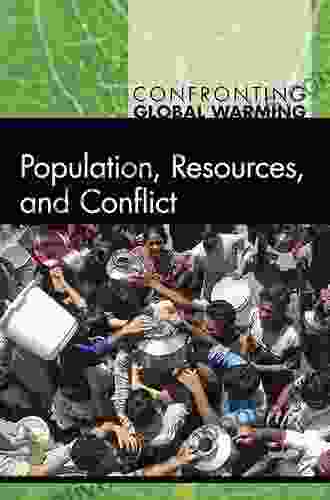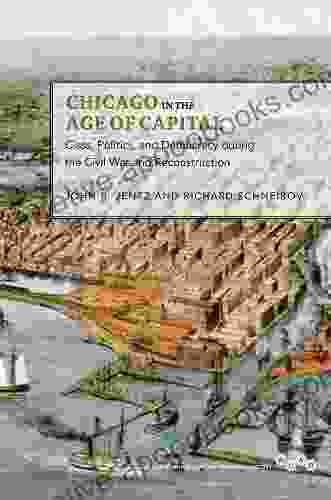Chicago in the Age of Capital: Unearthing the City's Hidden History

Chicago, a city synonymous with skyscrapers, industry, and global commerce, has a rich and multifaceted history. In his captivating book, "Chicago in the Age of Capital: Unearthing the City's Hidden History," historian Thomas J. Sugrue delves into the transformative decades of the 19th century, revealing the city's remarkable metamorphosis from a frontier town into a burgeoning metropolis on the cusp of becoming a global capital.
4 out of 5
| Language | : | English |
| File size | : | 1634 KB |
| Text-to-Speech | : | Enabled |
| Screen Reader | : | Supported |
| Enhanced typesetting | : | Enabled |
| Word Wise | : | Enabled |
| Print length | : | 330 pages |
Sugrue's meticulously researched narrative transports readers back in time to a rapidly evolving Chicago, where the forces of capitalism and industrialization intertwined to shape the city's destiny. He deftly weaves together diverse threads of the city's history, exploring the interplay between economic growth, social change, and the construction of the urban landscape.
The Dawn of a Capitalist City
The early 19th century witnessed the emergence of Chicago as a trading hub and transportation center. Its strategic location at the confluence of the Great Lakes and the Mississippi River system made it a vital artery for commerce, attracting merchants, traders, and speculators alike.
As the city grew, so too did its financial sector. Banks and investment firms proliferated, eager to capitalize on the expanding economy. The construction of the Chicago Board of Trade in 1848 marked a significant turning point, establishing the city as a major hub for agricultural commodities. In turn, the influx of capital and the development of financial institutions fueled industrial growth and urbanization.
Industrialization and Urban Transformation
The mid-19th century saw a surge in industrialization, transforming Chicago into a manufacturing powerhouse. The meatpacking industry, in particular, became a dominant force, with the city earning the moniker "Hog Butcher to the World." Iron and steel production also flourished, along with a host of other industries, contributing to Chicago's economic vitality.
The rapid growth of industry brought with it a surge of immigrants seeking work in the city's factories and packinghouses. German, Irish, Polish, and Bohemian communities emerged, shaping Chicago's ethnic and cultural landscape. The influx of workers also led to the expansion of neighborhoods and the construction of tenement housing, reflecting the city's growing pains.
The Shaping of the Urban Landscape
Chicago's transformation during this period was not merely confined to its economic and social fabric but also extended to its physical environment. The city's infrastructure underwent a major overhaul, with the construction of bridges, railroads, and canals dramatically improving transportation and communication.
Moreover, the Great Fire of 1871, while a devastating blow, provided an opportunity for urban renewal. Architects and city planners seized upon the chance to rebuild the city with a modern aesthetic and ambitious designs. The emergence of skyscrapers, such as the Home Insurance Building, became a symbol of Chicago's newfound status as a thriving commercial and financial center.
Social Inequality and Labor Unrest
The rapid growth and industrialization of Chicago also brought about social tensions and challenges. Alongside the economic boom, a stark divide emerged between the wealthy elite and the working class. Factory workers faced harsh working conditions and low wages, leading to labor unrest and strikes. The city became a hotbed of labor activism, with labor unions playing a pivotal role in advocating for workers' rights and improving their livelihoods.
A Global City in the Making
By the end of the 19th century, Chicago had firmly established itself as a global city, ranking among the world's leading centers of commerce, finance, and industry. Its towering skyscrapers, its bustling markets, and its diverse population symbolized its newfound status as a metropolis of international significance.
This transformation was not without its challenges, as the city grappled with issues of social inequality, labor unrest, and political corruption. Yet, amidst these challenges, Chicago's rise as a global capital was a testament to its resilience, its ambition, and its enduring legacy.
In "Chicago in the Age of Capital," Thomas J. Sugrue masterfully unravels the complex and transformative history of Chicago during the 19th century, capturing the city's emergence as a global capital. Through meticulous research and vivid storytelling, he illuminates the interplay between economic growth, social change, and the construction of the urban landscape, offering a profound understanding of one of America's most iconic cities.
This book is a must-read for anyone interested in urban history, economic development, and the making of modern America. Sugrue's insightful analysis and engaging prose make "Chicago in the Age of Capital" an essential addition to the bookshelf of historians, urban planners, and anyone eager to delve into the hidden history of one of the world's greatest cities.
4 out of 5
| Language | : | English |
| File size | : | 1634 KB |
| Text-to-Speech | : | Enabled |
| Screen Reader | : | Supported |
| Enhanced typesetting | : | Enabled |
| Word Wise | : | Enabled |
| Print length | : | 330 pages |
Do you want to contribute by writing guest posts on this blog?
Please contact us and send us a resume of previous articles that you have written.
 Book
Book Novel
Novel Page
Page Chapter
Chapter Text
Text Story
Story Genre
Genre Reader
Reader Library
Library Paperback
Paperback E-book
E-book Magazine
Magazine Newspaper
Newspaper Paragraph
Paragraph Sentence
Sentence Bookmark
Bookmark Shelf
Shelf Glossary
Glossary Bibliography
Bibliography Foreword
Foreword Preface
Preface Synopsis
Synopsis Annotation
Annotation Footnote
Footnote Manuscript
Manuscript Scroll
Scroll Codex
Codex Tome
Tome Bestseller
Bestseller Classics
Classics Library card
Library card Narrative
Narrative Biography
Biography Autobiography
Autobiography Memoir
Memoir Reference
Reference Encyclopedia
Encyclopedia Mona Liza Santos
Mona Liza Santos Lucy Langton
Lucy Langton Kieu Linh Caroline Valverde
Kieu Linh Caroline Valverde Allen Lyne
Allen Lyne Corey Croft
Corey Croft Chris Plekenpol
Chris Plekenpol Nicole Snow
Nicole Snow Allison Allen
Allison Allen Luis Angel Echeverria
Luis Angel Echeverria Alison Delaine
Alison Delaine Alvin R Mullen
Alvin R Mullen Altah Mabin
Altah Mabin M A Demle
M A Demle Alicia Kachmar
Alicia Kachmar Allene R Lowrey
Allene R Lowrey Alta Graham
Alta Graham Dan Amerson
Dan Amerson Suzanna Lynn
Suzanna Lynn Steven Parissien
Steven Parissien Jan Ollis
Jan Ollis
Light bulbAdvertise smarter! Our strategic ad space ensures maximum exposure. Reserve your spot today!

 Martin CoxUnveiling the Grit and Resilience of the War Widow: The Captivating Novel of...
Martin CoxUnveiling the Grit and Resilience of the War Widow: The Captivating Novel of... Leo TolstoyFollow ·15.9k
Leo TolstoyFollow ·15.9k Ervin BellFollow ·9.3k
Ervin BellFollow ·9.3k Anton FosterFollow ·16.2k
Anton FosterFollow ·16.2k Johnny TurnerFollow ·11.9k
Johnny TurnerFollow ·11.9k August HayesFollow ·12k
August HayesFollow ·12k Osamu DazaiFollow ·19k
Osamu DazaiFollow ·19k Emmett MitchellFollow ·5.7k
Emmett MitchellFollow ·5.7k Quincy WardFollow ·8.7k
Quincy WardFollow ·8.7k

 F. Scott Fitzgerald
F. Scott FitzgeraldUnravel the Enigmatic Murder of Mary Russell: A...
Prologue: A Grisly Discovery In the...

 Connor Mitchell
Connor MitchellLittle Quilts: Gifts from Jelly Roll Scraps
Embrace the Art...

 Harold Powell
Harold PowellPoverty Survival Hope In An American City: A Pulitzer...
A testament to the resilience of the human...

 Ray Blair
Ray BlairConfronting Global Warming: Population, Resources, and...
Global warming is one of the most pressing...

 Gary Cox
Gary CoxStyle Your Most Authentic Self and Cultivate a Mindful...
Unlock Your True...

 Caleb Long
Caleb LongEmbark on a Colorful Patchwork Adventure: Discover 20 To...
Step into the captivating world of...
4 out of 5
| Language | : | English |
| File size | : | 1634 KB |
| Text-to-Speech | : | Enabled |
| Screen Reader | : | Supported |
| Enhanced typesetting | : | Enabled |
| Word Wise | : | Enabled |
| Print length | : | 330 pages |










